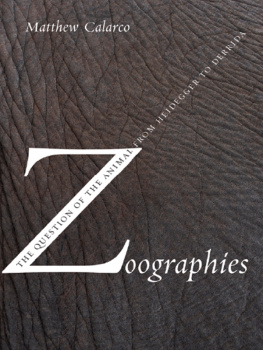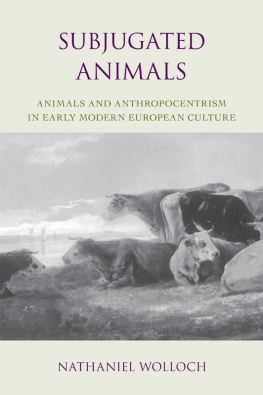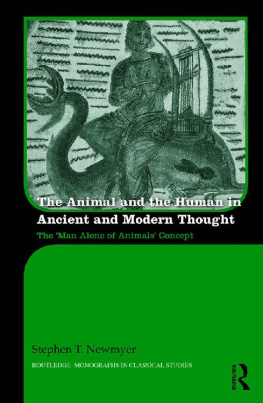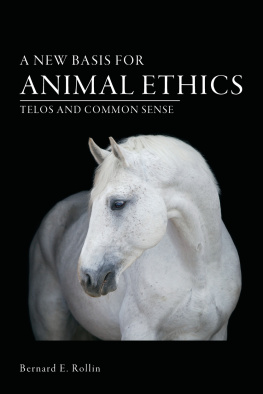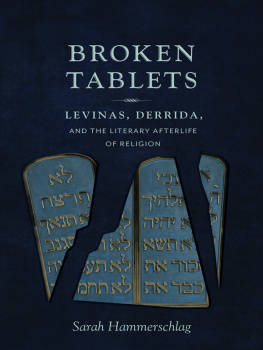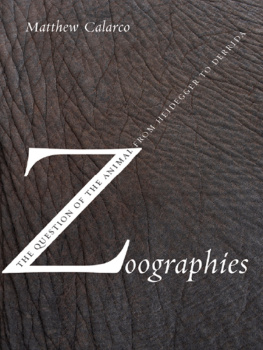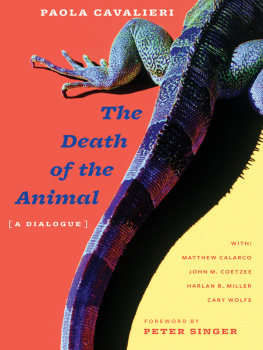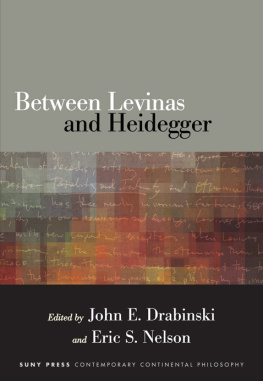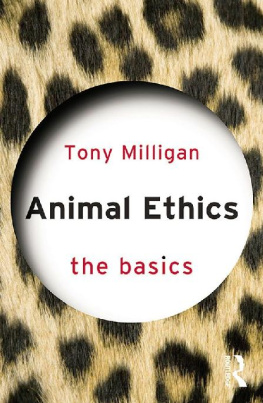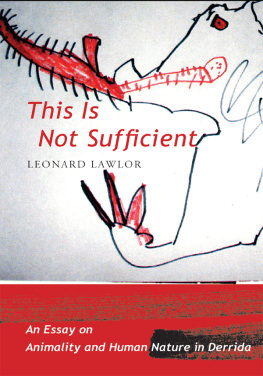ZOOGRAPHIES

THE QUESTION OF THE ANIMAL FROM HEIDEGGER TO DERRIDA
Matthew Calarco
COLUMBIA UNIVERSITY PRESS NEW YORK

COLUMBIA UNIVERSITY PRESS
Publishers Since 1893
NEW YORK CHICHESTER, WEST SUSSEX
cup.columbia.edu
Copyright 2008 Columbia University Press
All rights reserved
E-ISBN: 978-0-231-51157-5
Library of Congress Cataloging-in-Publication Data Calarco, Matthew, 1972
Zoographies : the question of the animal from Heidegger to Derrida / Matthew Calarco.
p. cm.
Includes bibliographical references and index.
ISBN 978-0-231-14022-5 (cloth : alk. paper)ISBN 978-0-231-14023-2 (pbk. : alk. paper)ISBN 978-0-231-51157-5 (e-book : alk. paper)
1. Animals (Philosophy)History20th century. I. Title
B105.A55C35 2008
179.3dc22
2007046991
A Columbia University Press E-book.
CUP would be pleased to hear about your reading experience with this e-book at .

In the course of writing this book, I have been assisted and supported in innumerable ways. I wish especially to thank the following people and institutions: Wendy Lochner for her initial interest in this project and for her generous patience and guidance during the writing and production process; Neil Badmington, Paola Cavalieri, Marc Goodman, Shaheen Moosa, Steven Vogel, and Jason Wirth for reading portions of different chapters and providing me with helpful feedback; two anonymous reviewers for Columbia University Press for their insightful suggestions; and Sweet Briar College Faculty Grants Committee for financial assistance.
I owe a substantial debt of gratitude to two people in particular. Peter Atterton has either read or discussed with me in conversation nearly every idea and argument laid out in this book. I envy his remarkable philosophical and critical abilities and count myself fortunate if even small traces of them have found their way into my writing. Nicole Garrett listened patiently to my ideas and helped me to clarify my thinking on more occasions than I am able to enumerate. Her support of and confidence in my work has sustained me in ways that she will never fully realize and that I can never fully convey. I dedicate this book to herand the animals, past and present, from whom she and I have learned to live.
I thank the publishers for permission to reprint the following materials:
Jamming the Anthropological Machine. In Giorgio Agamben: Sovereignty and Life, ed. Matthew Calarco and Steven DeCaroli. Stanford, Calif.: Stanford University Press, 2007. Stanford University Press.
ON PHILOSOPHY AND ANIMAL STUDIES
The present volume, while primarily philosophical in scope and content, was written as a contribution to the emerging interdisciplinary field of animal studies. While there is no widely agreed upon definition of what precisely constitutes animal studies, it is clear that most authors and activists working in the field share the conviction that the question of the animal should be seen as one of the central issues in contemporary critical discourse. This conviction stands in stark contrast to the reception the question has had in most individual disciplines in the sciences and humanities. In my home discipline of philosophy, for example, questions concerning animals are typically relegated by Anglo-American philosophers to a subspecialization within the field of environmental ethics, which is itself considered a minor area of applied ethics. Given that the field of applied ethics is, in turn, often viewed as a minor field in philosophy and (more pejoratively) as a distraction from more serious and substantial philosophical pursuits (namely, metaphysics and epistemology), it is no wonder that many philosophers interested in exploring the rich set of issues surrounding animals and animality have chosen to do so within the context of the semiautonomous region of animal studies. The main philosophical figures discussed in this volumewho include Martin Heidegger, Emmanuel Levinas, Giorgio Agamben, and Jacques Derridabelong to an alternative branch of philosophy sometimes referred to as Continental, or modern European philosophy. This approach to philosophy is characterized by, among many other things, its commitment to existential, ethical, and sociopolitical issues, and it is this engaged focus that serves (whether accurately or not) as one of the myriad ways of distinguishing Continental philosophy from its Anglo-American counterpart. It might thus seem that the question of the animal would find a welcome home in Continental philosophy; this has, however, historically been far from the truth.
One of the overarching aims of this book is to argue that the kinds of questions and concerns central to animal studies should become more important for philosophy in general and for Continental philosophers in particular, and I will make these arguments in due course. Another point that I hope to make in the pages that follow is that several of the tools, concepts, and theoretical frameworks of Continental philosophy, despite having their origins in a largely anthropocentric context, can make a unique contribution to animal studies, and I shall have much to say on this matter, as well. First, however, it will be useful to explain in a bit more detail what I take to be at stake in the field of animal studies and then explain why I have chosen to use the phrase the question of the animal in the subtitle of the book and as an entry point into the arguments made here.
Animal studies, or human-animal studies (as it is sometimes called), comprises a wide range of disciplines within the humanities, social sciences, and biological and cognitive sciences. As I just mentioned, there is no standard or widely accepted definition of the field, and its main terms and theoretical foci are still open-ended at this point. I would suggest, however, that the main stakes of the field lie in the effort to place questions concerning animals at the center of critical inquiry. The precise manner in which these questions are framed, debated, and answered depends, of course, to a large extent on the particular field of origin. And yet, despite the disciplinary differences and multiple theoretical approaches in animal studies, there are at least two recurring and structural questions that undergird much of the work being done in the field. One question concerns the being of animals, or animality, and the other concerns the human-animal distinction.
In view of the concept of animality or animal nature, many theorists have questioned whether there actually is a shared essence or set of characteristics binding all animals together. Much like the critique of essentialism in feminism, queer theory, and race studies, theorists in animal studies seek to track the ways in which the concept of animality functions to demarcate humans clearly from animals and establish homogeneities among what appear to be radically different forms of animal life. In so doing, they seek to demonstrate that the notion of animality plays more of a constitutive than denotative role in discourses about animals. Although such analysis is often (negatively) associated with postmodernist versions of linguistic idealism, it is often found, in fact, outside the humanities, especially in biological debates over the nature of species and the construction of taxonomies. Here, too, one finds persuasive arguments that the wide variety of beings referred to as animal cannot be reduced to any simple (or even relatively complex) set of shared characteristics.
Next page
